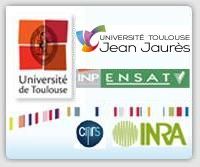
A professional and research master course
Skills and competences targeted
The Sigma master course aims to train specialists in geomatics applied to environmental and spatial planning questions. The students are prepared for a seamless employability.
This preparation implies a profound and complete knowledge of GIS and image analysis functions, as well as core computer science skills. Furthermore, it necessitates the thorough knowledge of spatial database conception, structuration and exploitation. The students are expected to apply these skills and knowledge to solve problems in a wide diversity of environments and contexts, often multidisciplinary and innovative.
Beyond the mastering of the tools, this preparation for the labor market aims to provide a real capacity to define and adapt the geomatics resources to the projects objectives (project management), in spatial planning and environment management domains. It also implies the development of skills in complex structures management and a sensibility to social and ethics implications of professional work.
Via a preserved link with the professional sector, surveys and labor market studies, our educational team is aware that the students of our master course will probably be the only geomatics specialist in their company or administration. Autonomy and communication skills are therefore important. They are exercised during the projects and the several restitution phases of the course.
Business sectors and professions targeted
The Sigma master course answers a social demand in spatial planning and environmental management. The relevant occupations (local communities and authorities, engineering consultants, service companies, …) require a dual competency : a sound knowledge of spatial data management and processing and a good grasp of the institutions, the regulations and the management procedures in those domains.
The course aims to train managers, engineers, planners, researchers, project managers, experts combining these skills to facilitate their entry into the professional world.
An experience of more than ten years built a dense network of relations with alumni, in professional work and research. This active network helps the educational team to define the interesting sectors and employment opportunities for our students.
Three professional profiles can be defined for the student employment opportunities:
- Engineer in charge of studies, study manager, researcher or policy officer, working with local authorities, semi-public firms, urban planning services, natural parks, chambers of commerce… They are often tasked with the definition, conception and management of the GIS and the interface between technicians and researchers or policy managers.
- Engineer or engineering project manager involved in engineering consulting or research services.
- "Expert" with international organizations (UNEP, WHO…) or non-profit organizations.
Research training
The majority of the courses are taught by members of one of the three research laboratories supporting the master’s program :
- GEODE (Géographie de l'ENvironnement, Geography of Environement), UMR 5602 UT2-CNRS
- DYNAFOR (Dynamiques et écologie des paysages agriforestiers, Dynamics and ecology of the agricultural and forest landscapes), UMR 1201 INPT/ENSAT-INRA
- LISST-CIEU (Centre Interdisciplinaire d'Études Urbaines, Interdisciplinary center of urban studies), UMR 5193 UT2-CNRS.
These research centers cover the main themes of the master course in applied geomatics : environmental management and spatial planning.
The "Geomatics as a scientific subject" cpurse was created in 2011. It aims to expose the implications, explore the issues and methods of geomatics in scientific research.
Research training and research by training are also present in the "geomatic workshops" where small group of students manage projects with tutoring. The projects are of professional or research type. The scientific ones are closely linked to the research programs of the supporting laboratories.
Moreover, the 4 to 6-month long internship offers possibilities of research training. A training agreement can be provided by a research laboratory and lead to a written essay, the preparation for a potential doctoral thesis work.
The master students willing to pursue research work can rely on the scientific networks of the professors and their labs.
Lifelong training and continued education
Up to one fourth of the student positions are reserved for continued training.

